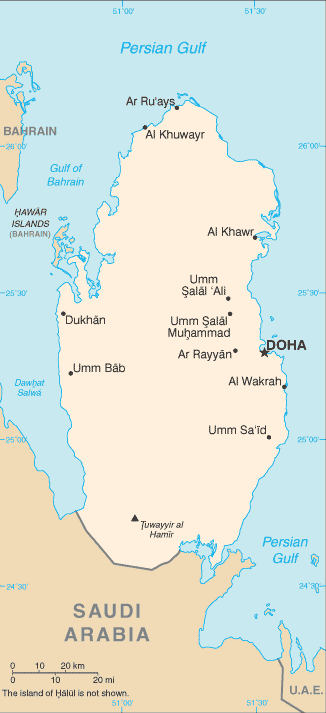State of Qatar
Related Categories:
 Flag of Qatar
Flag of QatarMaroon with a broad white serrated band (nine white points) on the hoist side. |
 Qatar - Fotw
Qatar - FotwDespite the near-villification of this flag over its individualistic approach to proportions, there is a fascinating story here.
www.fotw.us/
The name "Qatar" may derive from the same Arabic root as qatura which means "to exude." The word Qatura traces to the Arabic qatran meaning "tar" or "resin", which relates to the country's rich resources in petroleum and natural gas.
en.wikipedia.org/
Natives of the Arabian Peninsula, most Qataris are descended from a number of migratory tribes that came to Qatar in the 18th century to escape the harsh conditions of the neighboring areas of Nejd and Al-Hasa. Some are descended from Omani tribes. Most of Qatar’s 885,359 inhabitants live in Doha, the capital. Foreigners with temporary residence status make up about three-fourths of the population. Foreign workers comprise 52% of the total population and make up about 89% of the total labor force. Most are South Asians, Egyptians, Palestinians, Jordanians, and Iranians. About 6,000 U.S. citizens reside in Qatar.
For centuries, the main sources of wealth were pearling, fishing, and trade. At one time, Qataris owned nearly one-third of the Persian Gulf fishing fleet. With the Great Depression and the introduction of Japan's cultured-pearl industry, pearling in Qatar declined drastically.
The Qataris are mainly Sunni "Wahhabi" Muslims. Islam is the official religion, and Islamic jurisprudence is the basis of Qatar's legal system. Arabic is the official language, and English is the lingua franca. Education is compulsory and free for all Arab residents 6-16 years old. Qatar has an increasingly high literacy rate.
www.state.gov/r/
Introduction
About
Contact
Symbols in The News
Interpret this Symbol
AAC
African
AI
Alchemy
Alphabets
Ancient
Animal Symbolism
Architecture
Art
Articles
Astrology
Baha'i
Blissymbolics
Blueprint Symbols
Buddhist
Celtic Symbols
Cemetery
Chinese Symbols
Christian
Circle
City
Codes
Color
Conlangs
Crop Circles
Danger
Da Vinci Code
Designing Logos
Dictionaries
Dreams
Education
Egyptian Symbols
Electrical
Emoticons
Find Images
Fonts
Food
Fraternity
Hamsa
Healing
Heraldry
Hermetic
Highway Signs
Hindu
History
Hobo
Holiday
Icons
iConji
Islamic
Jain Symbols
Japanese, Kanji
Jewish
Justice
Law
Literary Symbolism
Mandalas
Map
Masonic
Math, Number
Meaning of Names
Medical
Middle East
Military
Miscellaneous
Money
Music
Mythology
Native American
Playing Cards
Power
Psychology
QiQiiKhu
Reiki
Religious
Runes, Norse
Sacred Geometry
Scientific
Science Fiction
Sorority
Sports
Symbols in the News
Tattoos
ThirteenSymbols
Tree of Life
Ursprache
Videos
Visual Languages
Weather
Web Codes
Wicca
Words
Writing Systems
Braille
Coinherence
Coptic
Cuneiform
Easter Island
Etruscan
Happy Human
Hebrew
Kokopelli
Linear B
Lotus
Love Symbols
Mandorla
Moon Alphabet
Nine Pointed Star
Om
Oz
Phonetic
Scarab Beetle
Silent
Theosophy
Unifon
About
Contact
Symbols in The News
Interpret this Symbol
AAC
African
AI
Alchemy
Alphabets
Ancient
Animal Symbolism
Architecture
Art
Articles
Astrology
Baha'i
Blissymbolics
Blueprint Symbols
Buddhist
Celtic Symbols
Cemetery
Chinese Symbols
Christian
Circle
City
Codes
Color
Conlangs
Crop Circles
Danger
Da Vinci Code
Designing Logos
Dictionaries
Dreams
Education
Egyptian Symbols
Electrical
Emoticons
Find Images
Fonts
Food
Fraternity
Hamsa
Healing
Heraldry
Hermetic
Highway Signs
Hindu
History
Hobo
Holiday
Icons
iConji
Islamic
Jain Symbols
Japanese, Kanji
Jewish
Justice
Law
Literary Symbolism
Mandalas
Map
Masonic
Math, Number
Meaning of Names
Medical
Middle East
Military
Miscellaneous
Money
Music
Mythology
Native American
Playing Cards
Power
Psychology
QiQiiKhu
Reiki
Religious
Runes, Norse
Sacred Geometry
Scientific
Science Fiction
Sorority
Sports
Symbols in the News
Tattoos
ThirteenSymbols
Tree of Life
Ursprache
Videos
Visual Languages
Weather
Web Codes
Wicca
Words
Writing Systems
Braille
Coinherence
Coptic
Cuneiform
Easter Island
Etruscan
Happy Human
Hebrew
Kokopelli
Linear B
Lotus
Love Symbols
Mandorla
Moon Alphabet
Nine Pointed Star
Om
Oz
Phonetic
Scarab Beetle
Silent
Theosophy
Unifon
